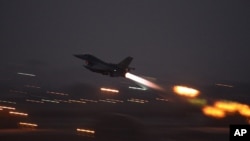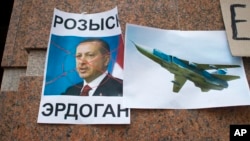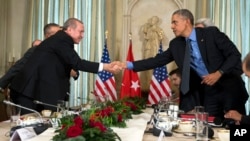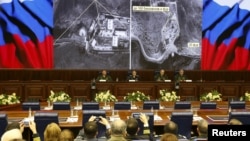Allegations that Ankara has been supporting Islamic State (IS) activities are finding little traction among Western governments that need Turkey’s help in the fight against IS, some analysts say.
U.S. Secretary of State John Kerry told reporters in Brussels that Turkish President Recep Tayyip Erdogan is ready to use Turkish forces with U.S. help to seal its borders with Syria and keep IS militants out.
A senior Turkish diplomat in Washington told VOA: “We are an active partner in the global coalition against IS. I can’t go into military matters. But I can confirm to you that we are discussing joint operations with the U.S. against IS terrorists in the near future.”
The government of NATO member Turkey has come under blistering domestic criticism for months over Ankara's handling of IS. Analytic and anecdotal evidence suggest the militant group has been able to flourish along parts of the Turkish-Syrian border partly because of the ruling AK party's Islamist sympathies and hopes that IS militants would help oust Syrian President Bashar al-Assad.
The claims escalated after Turkey last week shot down a Russian military jet that Ankara says was violating Turkish airspace. The Kremlin and Russian media say Turkey was protecting IS oil convoys that use Turkmen middlemen to funnel oil into Turkey for distribution.
Russian President Vladimir Putin called Turkey "an accomplice of terrorists." Prime Minister Dmitry Medvedev accused Turkey of supporting IS.
“There is passive support by the government and the security forces of Turkey for IS,” Michael Rubin, a Turkey analyst at the American Enterprise Institute, told VOA recently.
Still, Western governments continue to woo Turkey to help in the fight against IS.
Unprecedented cooperation
After attacks in Paris claimed by IS, Turkey and the United States say forces are poised to launch a major joint military operation aimed at closing a 98-kilometer strip of the Turkey-Syria border used by IS militants.
Turkey has agreed to let the French military fly sorties against IS from Turkish bases.
Turkey and the European Union agreed in recent days on measures to help stem the flow of migrants and refugees to Europe in return for cash, visa liberalization and renewed talks on joining the EU.
And, despite Russian protests over the downing of its plane, the West and the U.S. have, for the most part, stood by Turkey.
"In light of Russian harassment and warnings for the past several weeks, there's is a consensus that Turkey was justified in shooting down the plane, even though it was in Turkish air space for half a minute or less," Alan Makovsky, an expert on Turkish affairs issues at the Center for American Progress, told VOA.
Still, Makovsky said suspicions persist that Turkey is not doing enough to close the ground borders and that it is not genuinely committed to the fight against IS because it wants to keep Kurdish rebels from establishing a base in Syria.
"Turkey is clearly more concerned about toppling Assad and keeping [Kurdish rebels] in check than it is about destroying IS," he said.
But a Turkish diplomatic source told VOA that borders are difficult to control.
“Yes, some people are able to pass into Syria but to present this like Turkey is doing it intentionally is totally absurd,” he said.
IS oil trade issue
Erdogan also dismissed claims that Turkey is defending IS oil lanes. Oil smuggling is a key financing arm for IS and is worth up to $2 million per day, industry analysts say.
Erdogan said Turkey only gets oil and gas from known sources, adding that Turkey is trying to stop oil smuggling at its borders. Last week, he demanded that anyone who has evidence that Turkey is defending IS oil transfers should come forward with proof.
Russia tried to oblige Wednesday, when its Defense Ministry held a briefing to detail what it said were the three main routes used to ship IS oil from Syria and Iraq into Turkey, and used satellite imagery showing large columns of trucks to illustrate. It also accused Erdogan and his family of involvement in the IS oil trade, but provided no evidence for that claim.
Others allege illicit trade flows both ways across the border. Mahmut Tanal, a member of the Turkish Parliament from the CHP, the main opposition party, claimed that Turkish intelligence trucks were taking weapons to IS. He said this information was in a prosecutor's prepared file.
Can Dundar, the managing editor of Cumhuriyet newspaper which broke the story about trucks from Turkey's National Intelligence Organization (MIT) that were stopped by the Turkish military last year, was recently arrested in for revealing “state secrets.”
Psychological warfare
But Yonah Alexander, a terrorism expert from the Potomac Institute, told VOA that claims that Turkey is supporting IS are part of a psychological warfare against Ankara by anti-government interests.
“Turkey is a reliable member of NATO and a key partner in the fight against IS,” Alexander said.
But Soner Cagaptay, an expert on Turkish issues at the Washington Institute, told VOA that Turkey may have made its fight against IS harder by shooting down the Russian jet.
"Ironically Turkey's shooting down of the Russian plane to protect Turkmens and other Turkey-backed groups may have the opposite effect,” he said. “Russia now will bomb them with more vigor, and violence in northwestern Syria will escalate. This will potentially add to Turkey's current burden of 2.5 million refugees."
Turkey says the area where the Russian plane was shot down is home to Turkmens, people of Turkic heritage living in Syria. Ankara is providing Turkmens in the region with aid to survive Syria’s civil war.
"Only Syrian Turkmen who are our relatives are living in that region," Turkish President Tayyip Erdogan said in defending Turkey downing of the Russian warplane.
But Cengiz Aktar, a political analyst from the independent Taraf newspaper, wrote last week that any “argument that we are defending Turkmens is hollow and fake."
Aktar cited an article on the "Sendika7.org" website that says the region in Syria over which the Russian jet was flying has been occupied by Turkish-supported jihadists since 2012. She said that most Turkmens fled to Latakia in coastal Syria.







